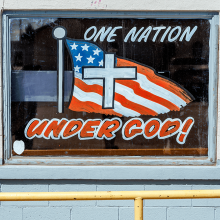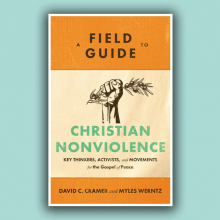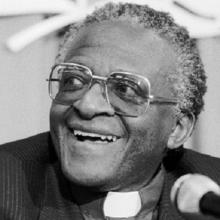Interview
The crises that Puerto Ricans are facing are not simply the results of “natural” disasters, according to Carlos A. Rodríguez. As founder and CEO of The Happy Givers, a Puerto Rico-based nonprofit that provides meals, rebuilds homes, and operates a community farm on the island, Rodríguez sees firsthand the harms of U.S. colonialism and climate change. On the island, residents are very clear that they are oppressed by their status as a colony, and when natural disasters hit, the pain is exacerbated.
“Centering the marginalized” is common parlance among both Christian and secular social justice advocates. This especially makes sense for Christians, as it was Jesus who said, “the last will be first, and the first will be last” (Matthew 20:16). So when it comes to seeking justice, it makes sense that we’d try to prioritize the experiences and perspectives of those our society discriminates against because of religion, race, gender, sexual orientation, or other identities. But two examples from this past year have made me doubt the viability of an identity-based approach for pursuing social justice.
Ever since Jan. 6, 2021, the term “Christian nationalism” has proliferated in discourse, but the precise definition is up for debate. Is Christian nationalism only applicable to those who welcome the label, like Georgia Republican Rep. Marjorie Taylor Greene, who sells “Proud Christian nationalist” t-shirts, and Southern Baptist Theological Seminary president Al Mohler, who said he wasn’t going to run from Christian nationalism on a recent podcast episode? Or can it be applied to hanging images of Jesus in congressional offices and the post-rapture book and movie series Left Behind?
Core to Christianity is this notion of hospitality and trying hard to hear your neighbor, hear what they’re trying to say, and even giving voice to what they’re trying to say. And you may not always agree with the melody. But part of what we see Jesus do is pay attention to the fact that every person in front of him has a melody that God’s given them.
In his new book, We Need to Build, Patel seeks to inspire others to build with him instead of just criticizing policies and structures they dislike. The book draws on Patel’s work with Interfaith America and considers what we can learn from good (and bad) institutions across the globe.
The devastation of the 1992 riots inspired Hyepin Im to advocate for the economic and political empowerment of underserved communities, including Korean Americans — and her own faith led her to look for ways that churches could be more effective partners in this work.
Last year, Suzanne Brennan Firstenberg, a social practice artist, created In America: Remember — a vast field of flags on the national mall, one for each American who died from COVID-19. Visitors, both in-person and digitally, had the opportunity to dedicate a flag by writing a message on the while poly film. When the installation began in mid-September of 2021, there were 666,624 deaths. When the installation closed in early October, there were 701,133 deaths. As of this week, nearly 1 million people have died of COVID-19 in the United States, 6 million globally. As we try to grapple with the weight of these fatalities, we’re revisiting an interview from late October 2021 between Firstenberg and Sojourners associate culture editor Jenna Barnett, in which they discuss what it looks like to honor grief and memorialize an ongoing pandemic.
As Baptist minister and CEO of the Religious Coalition for Reproductive Choice, Zeh has participated in plenty of “circular conversations regarding the moral absolutes of abortion.” But as she writes in her new book, A Complicated Choice: Making Space for Grief and Healing in the Pro-Choice Movement, these debates often overlook how abortion always “happens within a person’s real, full, and complex life.”
With scholarly precision and an ability to engage beyond the tired critiques of right-wing Christianity, Hendricks imagines a version of Christianity that is politically committed to social justice. Whether it is through his experience growing up in the Black church, his commitment to the revolutionary nature of Jesus’ teachings, or his insistence that leftist politics and Christianity can inform one another, Hendricks demonstrates the beauty of the Christian faith.
For most folks, Christian nonviolence evokes unified images of civil rights marches, Vietnam War resisters, and bumper stickers calling us to “turn the other cheek” or “beat swords into plowshares.” Yet Christian nonviolence isn’t a single school of thought, “but rather a rich conversation wrestling with what it means to live out the biblical call to justice amid the complexities of ever-changing political, social, and moral situations.”
Danté Stewart is a product of two of the most powerful traditions in the United States: the Black Christian tradition and the Black literary tradition. In his new book, Shoutin’ in the Fire: An American Epistle, Stewart traces how these traditions have touched his life and why he believes they can heal the Christian church and the United States.
“Trying to make our lives meaningful all the time is so stupid,” says Kate Bowler. “We can’t make every minute into a moment. Sometimes you just have to pay bills and show up for your friend and listen to her talk again about whether she should dump her boyfriend — and she should — and be in a faculty meeting and be in traffic.”
On Sept. 15, 2001, Balbir Singh Sodhi, a Sikh man, was killed while he was planting flowers at the gas station he owned in Mesa, Ariz., becoming the first victim of post-9/11 hate crimes. For then-college student Valarie Kaur, the murder of “Balbir Uncle”— as he is known to Kaur and others in the Sikh community — was a pivotal moment.

Image via Fort Greene Focus/Flickr
Saunders’ spirit of generosity, cloaked in the dark humor and melancholy of his stories, has made him something of a guru to younger writers. A practicing Buddhist, with a childhood in the Catholic Church, Saunders approaches his essays in particular with a spiritual frankness — comfortable with his own limits, unabashedly willing to admit what confounds him, and ready to tell the truth as faithfully as he can.
In July, he published his months-long attempt to understand Trump supporters and how they came to invest so much in a highly divisive, unconventional candidate. He seems both a natural and a jarringly wrong fit to capture this election season — perhaps the writer best ready to chronicle the already-absurd, and the one most willing to take it seriously. And at this moment in 2016, Saunders may be a kinder national narrator than we deserve.
THIS IS SURELY the most difficult beatitude. First, it’s hard to interpret. Does “meek” mean a Uriah Heep-like unctuous humbleness? Does it mean softness or gentleness or weakness? Are “the meek” the powerless, or perhaps the poor? Is their meekness to be displayed toward God, but not toward people? How meek is meek, and do you always have to let bullies kick sand in your face at the beach?
Next, what about “inherit”? That’s a legalistic term; who’s going to die so someone else gets an inheritance? Will the non-meek be pushed over a cliff so that only the meek are left? Or will the non-meek be lowered in status and the meek become rulers, thereby shedding their meekness?
And what about “the earth”? Another beatitude refers to the kingdom of heaven—the poor in spirit have it already, it seems—but “the meek” will instead inherit “the earth.” The material world.
Being Canadian, I memorized the beatitudes at school. But I wondered whether “the meek” had to be people. Could they be some other life form? Scottish physiologist J.S. Haldane felt God shows an inordinate fondness for beetles—having created so many—and my own father speculated that, if humankind destroyed itself by nuclear bombs or otherwise, the earth would be inherited by cockroaches. That would explain everything!
Sojourners interviewed Desmond Tutu, Nobel Peace Prize laureate and archbishop of the Anglican Church in Johannesburg, South Africa by phone on December 24, 1984.














